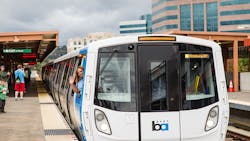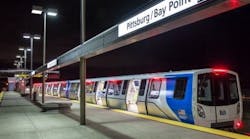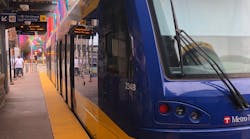FTA awards grant agreements to Minneapolis Southwest LRT, BART Transbay Corridor Core Capacity projects
Projects in San Francisco and Minneapolis have secured a combined $2.13 billion through funding agreements with the Federal Transit Administration (FTA).
Bay Area Rapid Transit District (BART) secured $1.2 billion for the Transbay Corridor Core Capacity project in San Francisco, Calif., and Minnesota’s Metropolitan Council secured $928.8 million for the Southwest Light Rail Transit (LRT) Project in Minneapolis, Minn. The funds are committed through FTA’s Capital Investment Grants (CIG) Program.
FTA provided a mandated 30-day review notice to Congress for both projects last month; with the review period at an end, funding agreements for both projects can move forward.
BART’s Transbay Corridor Core Capacity project
The $2.7-billion project is BART’s long-term effort to reduce crowding and increase service across the Bay.
The project will increase capacity in the Transbay Corridor between the city of Oakland and downtown San Francisco and consists of four main elements:
- 306 additional railcars to provide the trains needed to increase capacity.
- A new Communications-Based Train Control (CBTC) system that will allow more trains per hour through the Transbay Tube.
- The construction of a new storage yard on BART-owned property at the Hayward Maintenance Complex to accommodate the additional rail cars.
- The construction of five new substations in San Francisco and the East Bay to enhance the electrical system that will power the corridor’s trains.
"This investment in California will improve public transportation and support economic recovery in the Bay Area," said FTA Deputy Administrator K. Jane Williams. "This project will allow BART to operate additional trains through the Transbay Tube, helping to alleviate crowding and increase capacity in this critical corridor."
BART expects demand for transbay travel to rise dramatically once the region’s economy recovers after the COVID-19 pandemic. BART was running 23 trains in the peak commute hour in each direction through the Transbay Tube before shelter-in-place orders took effect in the Bay Area in March. The Core Capacity Program will allow BART to increase the number of transbay trains it operates during its busiest period to 30 per hour in each direction.
“This is a huge day for BART and anyone who needs to get across the Bay during commute hours,” said BART General Manager Bob Powers.
Southwest LRT
The Metropolitan Council’s $2-billion Southwest LRT Project will extend the existing Green Line, served by Metro Transit, 14.5 miles where it will serve 16 stations in Minneapolis, St. Louis Park, nearby Edina, Hopkins, Minnetonka and Eden Prairie.
Construction of the project began in November 2018 with an anticipated opening date in 2023.
“From a member of Congress to this state’s governor, the Southwest LRT has long been an important project to me,” said Minnesota Gov. Tim Walz. “While Southwest LRT is a project in the Twin Cities, there isn’t a county in the state this project won’t impact, from the businesses supplying construction material to creating thousands of jobs.”
Metropolitan Council notes the project has seen hundreds of millions of dollars of private investments along the line including development of affordable housing and commercial centers.
“Southwest LRT isn’t just another LRT line. It is a vital link between workers and businesses, people and housing, and is a backbone of a robust 21st century transportation system,” said Metropolitan Council Chair Charlie Zelle.
FTA Deputy Administrator K. Jane Williams said, "Commuters in this busy corridor can now look forward to faster and more efficient transit service connecting them to major employers downtown and in the suburbs as well as other key transit lines."

Mischa Wanek-Libman | Group Editorial Director
Mischa Wanek-Libman is director of communications with Transdev North America. She has more than 20 years of experience working in the transportation industry covering construction projects, engineering challenges, transit and rail operations and best practices.
Wanek-Libman has held top editorial positions at freight rail and public transportation business-to-business publications including as editor-in-chief and editorial director of Mass Transit from 2018-2024. She has been recognized for editorial excellence through her individual work, as well as for collaborative content.
She is an active member of the American Public Transportation Association's Marketing and Communications Committee and served 14 years as a Board Observer on the National Railroad Construction and Maintenance Association (NRC) Board of Directors.
She is a graduate of Drake University in Des Moines, Iowa, where she earned a Bachelor of Arts degree in Journalism and Mass Communication.




